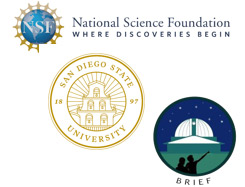Under the Broader Impacts task, the grant includes an annual 3-day workshop to instruct ten high school or community college teachers over three weekends. Topics will include exoplanets and binary stars, with a focus on transits/eclipses, the radial velocity method, and exoplanet radius measurement. Day 1 will contain lectures and lab demos on the background physics by SDSU professors and staff.
Days 2 and 3 will be based on teachers getting and analyzing their own observations via a modified BRIEF (Boyce-Astro) Exoplorer Program. Instructors will learn how to incorporate exoplanet observations into their STEM courses. Teachers will study the transit method of observation, target selection, make an observation of an exoplanet transit, calibrate, and then analyze their data. They will use the Exoplanet Watch’s EXOTIC to submit their results to NASA via the AAVSO Exoplanet Database. BRIEF will then support the teachers in implementing exoplanet projects for their classes and provide observational facilities using BRIEF’s two observatories or partner observatories.

